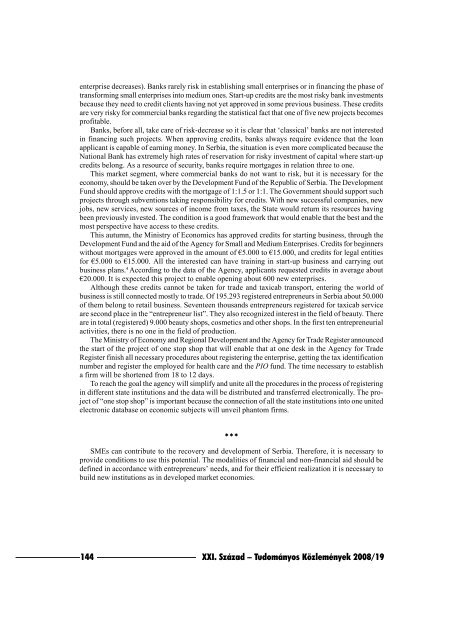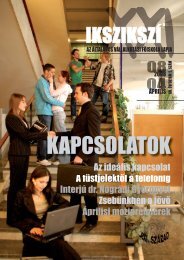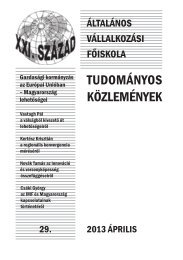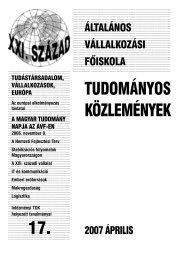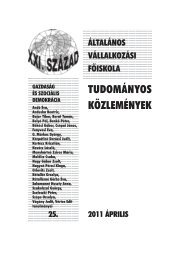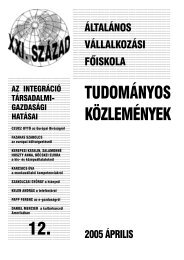Kis- és középvállaltok mint a gazdaságélénkÃtés tényezÅi - Ãltalános ...
Kis- és középvállaltok mint a gazdaságélénkÃtés tényezÅi - Ãltalános ...
Kis- és középvállaltok mint a gazdaságélénkÃtés tényezÅi - Ãltalános ...
You also want an ePaper? Increase the reach of your titles
YUMPU automatically turns print PDFs into web optimized ePapers that Google loves.
enterprise decreases). Banks rarely risk in establishing small enterprises or in financing the phase of<br />
transforming small enterprises into medium ones. Start-up credits are the most risky bank investments<br />
because they need to credit clients having not yet approved in some previous business. These credits<br />
are very risky for commercial banks regarding the statistical fact that one of five new projects becomes<br />
profitable.<br />
Banks, before all, take care of risk-decrease so it is clear that ‘classical’ banks are not interested<br />
in financing such projects. When approving credits, banks always require evidence that the loan<br />
applicant is capable of earning money. In Serbia, the situation is even more complicated because the<br />
National Bank has extremely high rates of reservation for risky investment of capital where start-up<br />
credits belong. As a resource of security, banks require mortgages in relation three to one.<br />
This market segment, where commercial banks do not want to risk, but it is necessary for the<br />
economy, should be taken over by the Development Fund of the Republic of Serbia. The Development<br />
Fund should approve credits with the mortgage of 1:1.5 or 1:1. The Government should support such<br />
projects through subventions taking responsibility for credits. With new successful companies, new<br />
jobs, new services, new sources of income from taxes, the State would return its resources having<br />
been previously invested. The condition is a good framework that would enable that the best and the<br />
most perspective have access to these credits.<br />
This autumn, the Ministry of Economics has approved credits for starting business, through the<br />
Development Fund and the aid of the Agency for Small and Medium Enterprises. Credits for beginners<br />
without mortgages were approved in the amount of €5.000 to €15.000, and credits for legal entities<br />
for €5.000 to €15.000. All the interested can have training in start-up business and carrying out<br />
business plans. 4 According to the data of the Agency, applicants requested credits in average about<br />
€20.000. It is expected this project to enable opening about 600 new enterprises.<br />
Although these credits cannot be taken for trade and taxicab transport, entering the world of<br />
business is still connected mostly to trade. Of 195.293 registered entrepreneurs in Serbia about 50.000<br />
of them belong to retail business. Seventeen thousands entrepreneurs registered for taxicab service<br />
are second place in the “entrepreneur list”. They also recognized interest in the field of beauty. There<br />
are in total (registered) 9.000 beauty shops, cosmetics and other shops. In the first ten entrepreneurial<br />
activities, there is no one in the field of production.<br />
The Ministry of Economy and Regional Development and the Agency for Trade Register announced<br />
the start of the project of one stop shop that will enable that at one desk in the Agency for Trade<br />
Register finish all necessary procedures about registering the enterprise, getting the tax identification<br />
number and register the employed for health care and the PIO fund. The time necessary to establish<br />
a firm will be shortened from 18 to 12 days.<br />
To reach the goal the agency will simplify and unite all the procedures in the process of registering<br />
in different state institutions and the data will be distributed and transferred electronically. The project<br />
of “one stop shop” is important because the connection of all the state institutions into one united<br />
electronic database on economic subjects will unveil phantom firms.<br />
***<br />
SMEs can contribute to the recovery and development of Serbia. Therefore, it is necessary to<br />
provide conditions to use this potential. The modalities of financial and non-financial aid should be<br />
defined in accordance with entrepreneurs’ needs, and for their efficient realization it is necessary to<br />
build new institutions as in developed market economies.<br />
144<br />
XXI. Század – Tudományos Közlemények 2008/19


